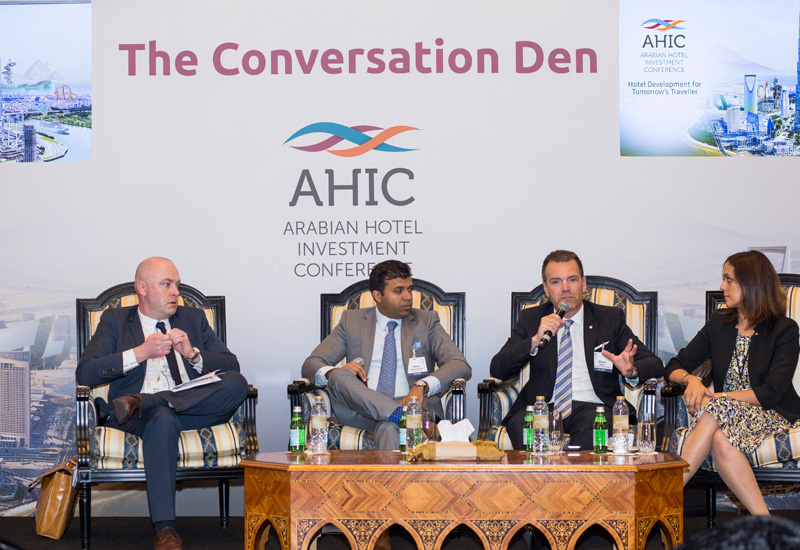For the 12th edition of the Arabian Hotel Investment Conference (AHIC) 2016, the theme chosen is “Eye on the Future — Vision for Success”, reflecting on how the hotel investment and operating community needs to work together and create a positive future for the industry, and work through the rise and rise of room supply, oil prices, security issues, the pressure on rates, and how to tap into the new market of Iran.
CBRE Middle East head of research and consulting Mat Green says: “Amidst sustained economic headwinds over the past 18 months, many of the Middle East’s hospitality markets have experienced declining hotel revenues, as global economic uncertainty, a slowdown in the BRIC economies, US dollar strength and political instability in parts of the region have combined to negatively impact hotel performances.”
Green says, however, that in 2015, the region’s markets were fragmented, with Dubai, Abu Dhabi and Jeddah proving to be more resilient to rising challenges, whilst Muscat, Doha and Manama suffered more markedly. “Oil price shifts and the subsequent reduction in liquidity in the Saudi Arabian economy certainly had a direct impact on the performance of hotels in neighbouring Bahrain, with occupancy rates down by around 5% during 2015, which in turn also resulted in negative RevPAR growth.”
Similar negative trends are prevailing in Q1 2016, opines Green, with oil prices registering below US $30 per barrel for much of 2016. According to recent data from STR Global, Green reports, January RevPAR in Qatar and Saudi Arabia declined by 21% and 13% respectively, versus the same month last year.
He continues: “Whilst the UAE has proven to be quite resistant thus far, potential constraints within government budgets and resulting reductions in public spending could yet lead to reduced demand from the corporate hospitality segment. In addition, close to 21,000 new hotel and hotel apartment keys are expected to enter Dubai between 2016 and 2018, with Abu Dhabi anticipating around 5,000 keys during the same time period. This additional supply will undoubtedly intensify competition, which in turn could lead to further pressure on hotel revenues going forward.”
However, CBRE still expects Dubai’s hospitality sector to perform well relative to other regional markets, primarily as a result of the sustained growth in tourist arrivals. During 2015, Dubai witnessed a 7.5% increase in visitor numbers, rising from 13.2 million in 2014 to 14.1 million in 2015. “Achieving this level of growth in spite of the current conditions is testament to the strength of the market, and whilst ADRs are likely to remain pressured, occupancy performance is expected to remain quite firm,” he adds.

| Advertisement |
KEY AREAS OF INTEREST
Speaking to some of the speakers and delegates, Hotelier Middle East found commonality in quite a few of the topics they were interested in: the financial markets, Iran, occupancy and supply.
Abjar Hotels International CEO Abdellah Essonni has been attending AHIC since its first edition, and the key issues he thinks will be addressed include the recent mega mergers, supply versus demand versus sustainability, the industry’s performance key indicators and transactions, OTAs vs brand.com, the sharing economy and Iran.
Knight Frank associate partner Ali Manzoor says the impact that a strong dollar has had on the travel industry in the GCC will be discussed, along with the potential of both Iran and Africa’s hospitality industry and whether the future pipeline in the Middle East is sustainable.
“We also expect to hear about the strength of emirates other than Dubai and Abu Dhabi — Ras Al Khaimah for example has been picking up traction in the last few years and events like this are a great opportunity for developers to find out more about such markets,” he adds.
IFA Hotels Investments CEO Joe Sita tells Hotelier Middle East that AHIC this year will deal with several issues which include the lead up to Expo 2020 and the impact on occupancy, supply and investment over the next three years.
“A more immediate subject will be the recent additional supply and the effect that has had on ADR and occupancy rates. The bearing that currency fluctuations in dollar strength and rouble weakness have had on demand also are likely to come into focus.”
Marriott International president Middle East & Africa Alex Kyriakidis agrees that the economy, the geopolitical landscape and safety & security will be front and centre this year. Other conversations within this framework will include, he says, “travel patterns, new and emerging segments, industry consolidation, the future of loyalty and how we’re shaping brand advocacy, OTAs and of course, the collaborative economy”.
Article continues on next page...






web.jpg)



 Search our database of more than 2,700 industry companies
Search our database of more than 2,700 industry companies









